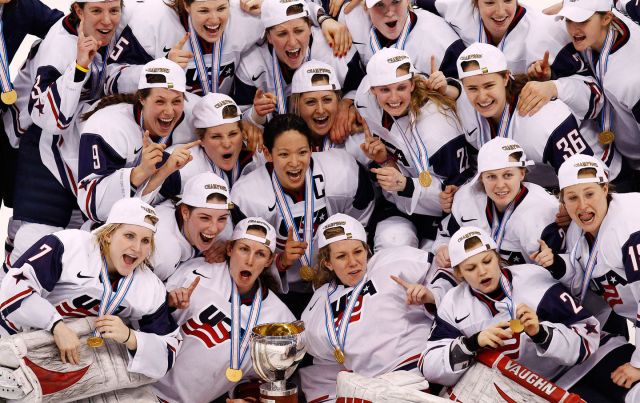
It is a remarkable — and remarkably unexpected — thing to write, but female athletes are now leading both the United States’ labour movement and the women’s movement for pay equity.
It is happening before our eyes, and it is worth noting even if you have never kicked a football or hit a puck. First, late last month, we had the staggering victory of the US women’s national ice hockey team. The players went on strike before the World Championships and won a series of demands — including salary raises so that they are now paid like the full-time athletes they are.
Their demands were ignored, mocked and then fought tooth-and-nail by USA Hockey. Yet they answered every challenge to win.
The players went public with their demands and built a groundswell that inspired solidarity from every sports union, male and female, in the US, as well as 16 US Senators.
They had won seven of the last nine World Championships and were willing to sacrifice that for the basic idea that being a full-time athlete and being paid like a part-time employee was no longer going to cut it. But it was bigger than wages.
Their push, as USA Hockey Hall of Famer Cammi Granato wrote at ESPNW, became about women in all sports standing up for themselves as athletes and workers: “The fact that the team is so unified from top to bottom makes the fight possible. The rally of support through social media and print and television media has showcased how there is a deep need for change.
“It is highlighted by the imbalances that still haven’t changed. The team wasn’t asking to get rich — what they wanted (and what USA Hockey finally agreed to) was financial support for giving their full dedication to the program ... These things have been long overdue.”
Now comes news that the US women’s national football (soccer) team has — at long last, following public campaigns, lawsuits, and the outspoken expression of their most prominent players — secured a five-year labour deal with USA Soccer.
The deal has much to praise. It makes long strides toward securing equal pay with the men’s squad — fitting for a women’s team that garners ratings during global competition that could make other sports leagues green with envy. It remedies the insult of meagre pay and the injury of lesser rights than their male counterparts.
The deal does not ensure pay equity, the rallying cry of this long campaign, but does ensure raises that will leave players earning as much as US$200,000 to $300,000 a year, plus victory bonuses. The deal also guarantees funding and support for parental leave, increased living expenses, and more input from players on their working conditions, travel and accommodations.
In addition — and this could become the most important part of the deal — the union won a portion of licensing rights, which will mean more revenue streams for the players.
This is a grand victory. It comes about a year after a high-profile complaint with the US Equal Employment Opportunity Commission issued by the highest profile members of the team: Carli Lloyd, Megan Rapinoe, Alex Morgan, Becky Sauerbrunn and Hope Solo. It is unclear what happens to that complaint now that there is a new contract.
On April 5, after the new deal was signed, Rapinoe told ESPNW: “I am incredibly proud of this team and the commitment we have shown through this entire process.
“While I think there is still much progress to be made for us and for women more broadly, I think the [Women’s National Team Players Association (WNTPA)] should be very proud of this deal and feel empowered moving forward.”
The fight for equal pay continues. WNTPA executive director Becca Roux told the New York Times: “We tried to completely change the methodology for how to define our value, and we made progress in that regard, and it changes the equation for the future.”
In other words, it is a step forward — and a significant one.
It is also worth taking a step back and looking at these two victories in the context of what happening in this country.
These are extraordinary times. There is an admitted sexual predator in the White House, rooms full of men are making health-care decisions for women, and the US vice-president believes in LGBTI reparative therapy and cast the deciding vote in the Senate to allow states to withhold federal funds for Planned Parenthood.
This is the context for the US women’s hockey and football teams sticking together and showing the world both what solidarity looks like and what can still be won.
Both battles predate the ascension of Donald Trump. But they don’t predate the poisonous sexism, attacks on women’s reproductive rights, or the endless, violent and organised harassment of women on social media that fuelled Trump’s rise.
The idea that these women not only did not give up after the election, but kept pushing should serve as inspiration to all of us. Women are currently the backbone of the resistance to Donald Trump.
Labour needs to be on the front lines against an administration seeking to roll back even the meagre rights still enjoyed by working people. These women in sports could be the connective tissue between the women’s movement and the labour movement.
I certainly never would have guessed the bridge between these struggles could be forged by football and hockey players. But athletes really do hate to lose — and we could all stand to walk with a little bit of that swagger.
As former NFL player and union leader Dave Meggyesy once said to me: “We’re jocks. On the field or the picket line, we really hate to lose.”
[Compiled from Edge of Sports.]